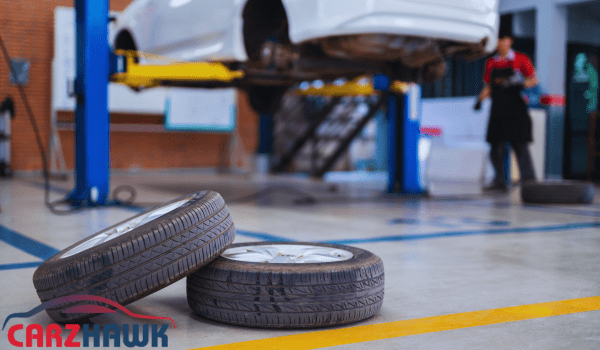It can be hard enough to change the tires on a regular car, but think having to do it on an SUV or monster truck. The tire weigh changes to support the car’s growing weight and make it run as safely and efficiently as possible.
There are a lot of things to think about when looking at a tire’s weight, like what it is and where it’s supposed to go. An SUV that often drives through snow might have special snow tires that weigh more than standard tires.
Most car tires weigh between 15 and 27 pounds. But the type and size of the tire are just a few of the things that can change how much it weighs. Tires for big trucks can weigh up to 80 pounds, while tires for small cars might only weigh 15 pounds.
We’re going to look more closely at what tires weigh, why different cars need different ones, and how the weight changes.
What makes a tire’s weight change?
1. Size
The size of the tire is the most obvious thing that affects its weight. Because it’s bigger, a truck tire will almost always weigh more than a car tire. When the width gets bigger, more material is used, which means the thing weighs more.
What makes a tire heavy is its thickness and how much air it can hold. It will be able to hold more air if your tire is wide and tall. The weight of this air does add to the weight of the tire.
2. Car and Type of Tire
Tires have very different weights for different cars. For example, think about the size of tire you’d need for a Jeep Wrangler versus a Fiat 500. That means both the type of car and the type of tire are important.
You can switch these out for all-terrain or snow tires, which come in a range of weights and sizes. An SUV tire is already much bigger than a regular car tire.
This is why it’s very important to know Tire Weigh before picking a type.
3. How it works
Other things that need to be thought about when looking at the weight are the tread and how the tires are used. There is extra wear on all-terrain tires that helps them do their job, which is to get you through rough roads. This adds weight.
These tires may look like regular SUV tires in terms of size, but that doesn’t mean they weigh the same. High-end tires may also weigh more because they have more layers of rubber to protect and improve their performance.
Different Kinds of Tires
1. Passenger Car
One type of car is the passenger car. A passenger car wheel usually has a tire weigh 27 pounds and a rim that weighs 30 pounds. But because they come in sizes from 13 to 20 inches, this weight can change.
Again, 13-inch tires will weigh less than this, which could be what you need. Check out different sizes to find the right one for your car.
You can see that even the same type of vehicle has a huge range in tire weight, which is why it’s so important to find the right size for your car. This helps with performance and general safety.
2. Business Truck
Obviously, a tire for a business truck will weigh a lot more than a tire for a passenger car. But how much does a tire really weigh? Tires can be anywhere from 19.5 inches to 24.5 inches wide, so you can guess how heavy some of them are!
It’s easy to see why business trucks drive so many miles—they can weigh anywhere from 66 to 176 pounds and could get even bigger. Because of how much weight will be added, trucks need tires that are so big.
Most of the time, a passenger car can only hold up to seven people, but these trucks could be bringing whole loads of groceries for stores.
This load is really heavy, and it needs to be spread out properly so that it gets where it needs to go safely. One reason why tires are so heavy is because of this.
3. Pickup or SUV
SUV tires can be anywhere from 17 to 24 inches across, which is a lot bigger than you might think.
You can move your stuff into an SUV or truck, and then take your family on a camping trip. Because of this, the weight they have to carry is always changing. This also means that the tire’s weight changes all the time.
If you’re going to use your truck to cross-country haul boxes or go off-road, you might want to get bigger tires. But if you’re just using your SUV as a family car, 18-inch tires should be fine.
A 17-inch tire weighs about 24 pounds, while a 24-inch tire can weigh up to 176 pounds. In 2019, 18-inch tires that weigh about 30 pounds were the most popular size for SUVs.
4. The Monster Truck
Monster truck tires have to be really big so that the trucks can do the crazy tricks they do every day. These are made in a special way, maybe not to hold weight but to make sure they don’t blow out in the middle of a jump.
For the most part, the tires are the same ones that are on farm equipment. They are 66 inches tall and 43 inches wide. Even though it’s hard to believe, this can hold up to 800 pounds. That makes sense, though, with six feet of pure rubber.
5. A Golf Cart
These days, golf cart tires are 18 inches tall and 8 inches wide, which is pretty big for such a small vehicle.
Even though golf courses are smooth, the tires don’t weigh that much because the carts don’t have to go over rough ground. Most of them weigh about 10 pounds and do fine.
6. Motorbike
To keep the driver safe, it’s important that the motorbike has as little weight as possible. This is why the tires are so small and light. The front tires weigh less than the back ones, and the average size is 16 inches. They weigh between 8 and 30 pounds.
Motorcycle tires are very different from passenger car tires in that each tire weighs a different amount. On the other hand, most passenger car tires weigh the same.
7. Snow and All-Terrain
Some of these tires have more rubber and tread than others because they are made to handle rough areas. This makes them heavier. These weigh between 20 and 40 pounds and do the job.
8. Trailers
and their tires come in a lot of different types and sizes. The tires don’t weigh that much, but you do carry some weight in a trailer. Each of these tires weighs about 10 pounds, but a single car could have up to 8 of them.
9. Tractor
As we already said, a tractor’s tires are close to, if not the same as, the tires on monster trucks that weigh around 800 pounds. Other farming tools have tires that are much smaller and lighter than these, with some weighing only 30 pounds!
FAQs
How Much Do Most Tires Weigh?
What makes a tire weigh what it does is hard to say because there are so many things that affect it. The average ranges from 12 pounds to 132 pounds, which is a pretty big jump!
Do Bigger Tires Make the Ride Smooth?
The size of your tires has a huge impact on how your car moves. Though bigger tires give you more grip on the ground because they cover more ground, that doesn’t always mean the ride will be smoother.
If you have bigger wheels, the ride will be rougher, but it might be easier on rough ground. If you want a better ride, you might want to check out changing the tire’s thickness instead of its diameter.
How Do You Find out How Much a Tire Weighs?
It’s very helpful to know what size tires fit your car because it makes getting new tires and buying tires much easier. Find the tire’s size on the sidewall, right after the size itself, if you don’t know what size your present tires are.
What’s Heavier: The Tire or The Wheel?
There is a difference between a wheel and a tire that a lot of people don’t understand, even though they can be used in the same way. The rubber part that generally weighs between 27 and 33 pounds is called a tire.
Wheels are the metal parts, called wheels, that hold the tire in place. They weigh between 27 and 31 pounds. In short, tires are heavier.
Do Bigger Tires Change How Much Gas You Use?
When it comes to gas efficiency, tires are just extra weight. Picture it like when you have a big load on your back.
If you go through the same amount of gas with a big load and a light load, you’ll see that you use a lot more when you have more weight in the car. The same way that heavier tires make you use more gas.
Conclusion
What the tire is used for and how it was made can change its weight from 17 pounds to 800 pounds.
A car tire weighs about 27 pounds on average, while an SUV tire weighs about 48 pounds on average.
You can change your car’s tires to get the speed you want, but don’t make the change too big or you might have problems.
It’s very important to know how much your tires weigh for safety, gas mileage, and how well your car moves. That’s why you should always check what size and weight is best for your car.









